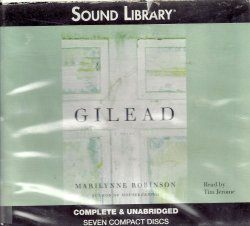by Marilynne Robinson
read by Tim Jerome
BBC Audiobooks America, 2004. 7 CDs.
My co-worker Lynne Imre recommended these books, and I’ve long been meaning to read Housekeeping, so I grabbed an audiobook, which is my way of reading books I’ve long been meaning to read.
This reminded me of the Marilynne Robinson nonfiction I’ve read, When I Was a Child, I Read Books. The fictional story is narrated by an old preacher in 1956, writing a letter to his young son. The preacher, John Ames, has a heart problem, and doesn’t think he will live to see his son reach adulthood.
The book is gentle and philosophical, and has some Scriptural insights thrown in throughout, since, after all, a preacher is narrating.
Reverend Ames tells about his father and grandfather, both preachers before him. His grandfather was an abolitionist and a character.
In many ways, the book is a meditation on fathers and sons, and blessings handed down from one generation to the next. Besides John Ames’ own family, his dear friend and fellow preacher has a wayward son who was named after John Ames. Young Jack comes back to town and he and the preacher embark on a journey of understanding, forgiveness and blessing.
This is a slow moving novel, but a rich one. I didn’t always hurry to put in the next CD when one ran out, and it’s not the kind of book that it’s hard to stop the car and shut off the sound when you arrive at your destination. But sometimes that’s the best kind of audiobook — something to mull over on your commute, which will stick in your thoughts.
The reader has a deep, rich, friendly, thoughtful voice. He made it easy to imagine an old preacher speaking these words.
Find this review on Sonderbooks at: www.sonderbooks.com/Fiction/gilead.html
Disclosure: I am an Amazon Affiliate, and will earn a small percentage if you order a book on Amazon after clicking through from my site.
Source: This review is based on a library audiobook from Fairfax County Public Library.
Disclaimer: I am a professional librarian, but I maintain my website and blogs on my own time. The views expressed are solely my own, and in no way represent the official views of my employer or of any committee or group of which I am part.
What did you think of this book?
